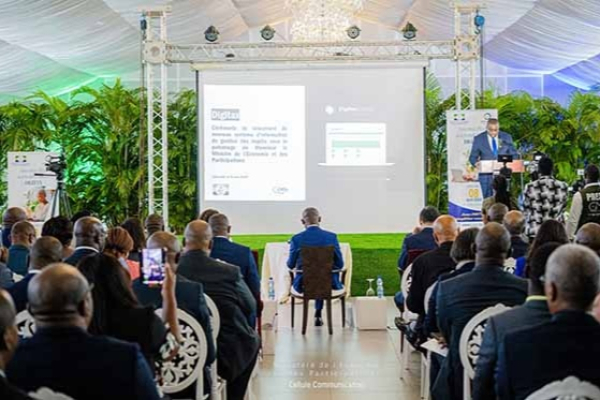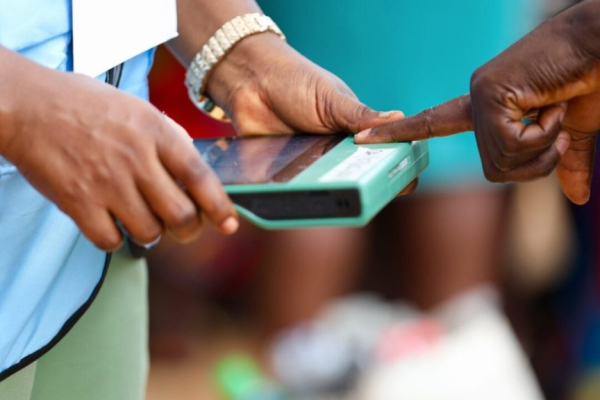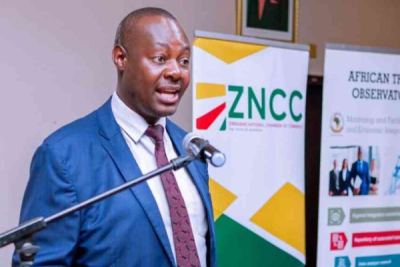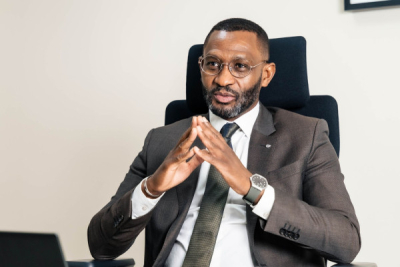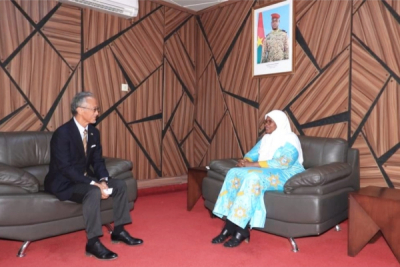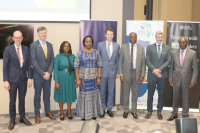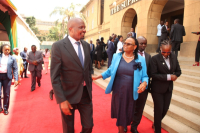
Public Management (599)
In a bid to enhance tax services management, tax authorities have invested in a new digital solution. It will replace the existing E-tax portal.
On Monday 8 April in Libreville, Gabon's tax authority inaugurated the "Digitax Gabon," a platform designed to simplify the collection of corporate tax revenues. The initiative mainly aims to optimize tax management and improve relations between taxpayers and the tax authorities. The launch ceremony was attended by Minister of Economy Mays Mouissi, Minister of Public Accounts Charles M'Ba, and Minister of Communication Laurence Ndong.
"This initiative, supported by the General Directorate of Taxes (DGI), aims to revolutionize tax management in Gabon by digitalizing administrative procedures. Digitax Gabon represents a major shift in the modernization of Gabon's tax administration. This innovative platform will enable the integrated management of all tax processes, including the management of the tax base, tax collection, tax auditing, the handling of disputes, and the remote payment of taxes," explained the tax authorities.
The new platform is in line with the public administration modernization drive initiated by Gabonese authorities in 2021, with the rollout of a plan to transform the economy. The country has since undertaken several initiatives to remain at the forefront of the technological revolution underway on the continent. Last January, Gabon secured a $68.5 million loan from the World Bank to accelerate its digital transformation through the "Digital Gabon" project.
For the September 2023- February 2024 period, the Ministry of the Economy’s tax collection target was XAF419.5 billion (around ‘686.3 million) but the actual collection stood at XAF560 billion.
Adoni Conrad Quenum
With a population of over 220 million, Nigeria is the most populous country on the African continent. It is therefore crucial for the government to establish an effective system for the clear identification of its citizens and residents.
IDEMIA Smart Identity, a division of French identity technology firm IDEMIA, announced the renewal of its partnership with the Nigerian National Identity Management Commission (NIMC) on Tuesday. The collaboration aims to upgrade the NIMC’s biometric system, making it one of the most advanced globally, according to IDEMIA. The future biometric matching system will be capable of processing up to one million identity verification searches daily.
“Taking this next step in the enhancement of our system with IDEMIA Smart Identity was a natural choice for us. We wanted to ensure that we deliver the best-in-class solution to our fellow Nigerians, and the pure power of the biometric matching we will receive ensures that the solution is future-proof for our growing population,” said Abisoye Coker-Odusote, CEO of NIMC.
The initiative is part of the Nigeria Digital Identification for Development (ID4D) project, funded by the World Bank since 2020. The project aims to issue digital identities to 148 million citizens by June 30, 2024, a goal that Nigeria appears to be on track to achieve, according to a recent World Bank report.
The partnership renewal follows the government’s recent announcement of the introduction of innovative identity cards with a payment function, powered by AfriGO, a national domestic card system. This will enable all types of social and financial services.
The system upgrade should allow NIMC to provide all Nigerians with access to a secure and reliable identity, enabling them to exercise their rights and responsibilities as citizens. The initial system was designed to handle 100 million entries, but it has now been upgraded to handle around 90 million registrations. This necessitates the extension, which will include 250 million entries to cover the entire Nigerian population.
Samira Njoya
The 2Africa subsea cable aims to interconnect Europe, Asia and Africa. Its landings in African countries are encouraging partnerships to improve connectivity on the continent.
Authorities in Akwa Ibom State have entered into a partnership with MainOne, a leading West African provider of data centers and connectivity solutions, to construct approximately 140 kilometers of fiber optic infrastructure in the region. The partnership, announced on April 5, aims to provide high-speed connectivity across several regions of southern Nigeria.
This collaboration follows the February landing of the 2Africa cable at Qua Iboe in Akwa Ibom State. The 45,000-kilometre fiber optic submarine cable, part of a consortium led by American company Meta, the parent company of Facebook, Instagram, and WhatsApp, will connect Europe, Asia, and Africa, with a nominal capacity of up to 180 terabits per second.
Abayomi Adebanjo, Regional Director of MainOne, stated at the 2Africa landing that his company is "dedicated to improving Internet capacity and driving various aspects of development, including economic growth, digital transformation, healthcare, security, agriculture and increased state revenue in South-South Nigeria."
In addition to the 2Africa cable, Nigeria is connected to six other cables: Google's Equiano, SAT3, MainOne, Glo1, Africa Coast to Europe (ACE), and West Africa Cable System (WACS). As of February 2024, the Nigerian Communications Commission (NCC) reported that 163.3 million people in Nigeria had Internet access, with 93.4 million having broadband access.
Adoni Conrad Quenum
Zimbabwe wants to join the technological revolution ongoing on the African continent. For that purpose, it seeks strategic partners to support the development of its tech sector.
Zimbabwe’s government has sought the support of the United Nations Conference on Trade and Development (UNCTAD) to bolster its digital economy, according to Douglas Runyowa, Chief of Staff at the Ministry of Industry and Trade.
Runyowa announced the appeal for UNCTAD’s assistance in conducting an eTrade readiness assessment to identify opportunities and solutions for ecommerce development. This request aligns with Zimbabwe’s efforts to expedite its digital transformation under President Emmerson Mnangagwa’s “Vision 2030”. The strategic plan aims to transform Zimbabwe into a high-income society by 2030, with digital technology as a key pillar of socio-economic development.
The International Finance Corporation (IFC) and Google project that Africa’s digital economy will be worth at least $712 billion by 2050, accounting for 8.5% of the continent’s GDP. Recognizing its current lag in the sector, Harare is intensifying its partnerships to leverage the ongoing technological revolution in Africa.
"The key areas include e-commerce assessment and policy formulation, information communication technology (ICT) infrastructure and services, payment solutions, trade facilitation and logistics, legal, regulatory framework, digital skills development and access to finance," added Douglas Runyowa.
In recent years, African countries have accelerated the digitization of government services. The aim is to improve administrative efficiency and data management as well as improve citizens’ lives.
The government of Cape Verde plans to digitize 60% of essential public services by 2026, according to Carlos Tavares Pina, CEO of the government’s digital agency, Nucleo Operacional da Sociedade de Informacao (NOSi).
According to Pina, the digitization initiative aims to foster transparent governance by improving access to information, securing digital infrastructures, and enhancing digital literacy. The move is part of the Digital Governance Strategy, a component of Cape Verde’s broader Digital Strategy.
The strategy includes modernizing all public services, such as online certificate issuance (birth, marriage, adoption, death, criminal records, company name registration), electronic payment, tax identification number issuance, state debt certificates, and income certificates for children’s study grants.
To achieve these goals, the government is relying on its digital agency, NOSi. The agency is increasing partnerships with global technology companies like Huawei and Microsoft and collaborating with countries with similar projects.
The ultimate goal is to have at least 30% of public administration processes running on AI or ML (machine learning) technologies and to use cloud technologies to enhance platform interoperability.
The digitization of public services in Cape Verde is expected to drive digital transformation, stimulate the country’s business environment, and boost national GDP. These services will also provide a centralized information point for citizens.
Samira Njoya
Digital technology plays a crucial role in Japan's economy, society and technology. Having made significant progress in this field, the country is keen to share its knowledge and successes with other nations, including Burkina Faso.
Japan is ready to support Burkina Faso in the implementation of its digital projects, Japanese ambassador to Burkina Faso, Jun Nagashima (photo, left), said during an audience with the Minister for Digital Transition, Posts and Electronic Communications, Aminata Zerbo/Sabane (photo, right), on Friday, March 22.
"On behalf of Japan, I want to reiterate our strong commitment to continuing cooperation with Burkina Faso, especially in the digital realm. In today's globalized world, digital technologies are essential drivers of development. Japan has extensive experience in this field, and we're eager to share that knowledge and collaborate with Burkina Faso," said Jun Nagashima.
Japan has been among the leading nations in technology, especially robotics, for several decades. Japanese companies have developed numerous prototypes to simplify people’s lives. The country also excels in artificial intelligence, the Internet of Things (IoT), and video games. In 2016, the Japanese government launched an initiative called Society 5.0, aimed at leveraging technology to address societal and economic challenges such as an ageing population and regional disparities in living standards.
In the realm of telecommunications, Japan is at the cutting edge of technological advancements in fibre optics development. The country holds the record for high-speed internet access, with Japanese scientists achieving a transmission of 22.9 petabits per second in a single optical fibre in December.
Collaboration in these areas would allow Burkina Faso to fully benefit from Japan’s advanced digital transformation expertise. Through experience sharing, Burkina Faso could leverage Japan’s proficiency, particularly in the development of digital administration, digitisation of public services and administrative procedures, and the application of artificial intelligence, among other areas.
Samira Njoya
In addition to collaborating with nations across different continents, African countries are joining forces to accelerate their digital transformation. This is the case of the cooperation between Zimbabwe and Mozambique in the judicial sector.
Mozambique plans to digitize its entire judicial system. Against this backdrop, the President of the Mozambican Supreme Court, Adelino Manuel Muchanga (photo, left), visited his Zimbabwean counterpart, Luke Malaba (photo, right), on Wednesday 20 March. The aim was to learn more about the Integrated Case Management System (IECMS) used by the Zimbabwean judicial services.
"We came to see what happened in Zimbabwe when it came to implement successfully the system and I think the key to the success, among other reasons, is that this is a national program," says Adelino Manuel Muchanga. He continued: "We are at the starting point and I think we will take this experience to Mozambique and see how we can involve the Government and other stakeholders so that we implement the system for many advantages that the systems can bring to the efficiency of the judicial system in Mozambique."
Like many African countries, Mozambique is in the process of digitally transforming key sectors of its economy. Countries such as Senegal, Côte d'Ivoire, and Kenya have already embarked on this path, investing several million dollars in the process. Earlier this month, the Chief Justice of the Supreme Court of Kenya, Martha Koome, set 1 July as the deadline for her country's courts to stop printing pleading documents. These decisions aim to improve the efficiency of the judicial system and facilitate access to legal services for the population, notably those living in remote or isolated areas.
Zimbabwe's judicial services have been using IECMS since 2018. According to Luke Malaba, it particularly helped Zimbabwe improve efficiency and transparency in the sector.
Adoni Conrad Quenum
African nations are increasingly digitizing public services but the initiatives require significant resources. For that purpose, governments are partnering with strategic allies to overcome the significant costs associated with them.
Zambia’s government and Trade Mark Africa, a trade aid organization, inked an $11 million deal on Wednesday to digitize the Nakonde border post, a strategic crossing point with Tanzania and Malawi. The project, funded by the British government and the World Bank, is expected to be completed in twelve months.
The initiative aims to streamline control processes and cut the transit time for goods at the Nakonde border from an average of three days to just ten hours. It includes a broad spectrum of interventions such as infrastructure upgrades, modern scanning systems, digitization of customs clearance processes, and cross-border interconnectivity for information exchange.
According to Zambia’s Finance Minister, Situmbeko Musokotwane, the initiative encompasses a wide range of interventions, including infrastructure improvements, modern scanning systems, digitization of customs clearance processes, cross-border interconnectivity for information exchange, smart digital solutions, change management, and integrated border management.
Nakonde facilitates trade between Zambia, Tanzania, the Democratic Republic of Congo (DRC), and Zimbabwe. It generates around 3.1 billion kwachas ($118.5 million) annually, with 65% of goods transiting through Zambia, of which 35% are destined for the country led by Hakainde Hichilema.
Adoni Conrad Quenum
Since President William Ruto assumed office in Kenya in September 2022, the pace of the country's digital transformation has accelerated, with the digitization of numerous public services now a reality.
Kenya is set to digitize its judicial services starting July 1, 2024. The announcement was made by Martha Koome (photo, center), the President of the Supreme Court, on Monday, March 11. The primary objective of this initiative is to enhance productivity, streamline processes through automation, and establish a paperless environment. These efforts aim to make justice more accessible in Kenya while reducing geographical barriers.
"I launched e-filing for all courts countrywide, a Data Tracking Dashboard and Causelist Portal marking a giant leap in our commitment to transforming how we deliver justice through the strategic use of technology, in alignment with the Social Transformation through Access to Justice (STAJ) blueprint of the Judiciary," stated Martha Koome.
Furthermore, Koome emphasized that starting from July 1, 2024, courts will no longer print pleadings and documents. The resources previously allocated for paper and ink will now be redirected towards acquiring desktops and laptops, along with training initiatives.
These initiatives are part of Kenya's National Digitisation Plan (2022-2032), which was established shortly after President William Ruto assumed office in September 2022. As Kenya strives to position itself as a key player in the technological landscape, the digitization process has gained momentum across various sectors. The country has secured funding from diverse organizations and entities such as the World Bank and the European Union to support its digital transformation endeavors.
It is worth noting that the digitization of judicial services commenced last year with the introduction of e-filing in Mombasa County in April 2023. "We are now reaching a national scale with court stations in the remaining 34 counties being on-boarded today. This marks a transformative step in making our justice system more efficient and accessible," explained Martha Koome.
Adoni Conrad Quenum
Artificial intelligence (AI) is rapidly emerging as a key technology of the fourth industrial revolution. While offering significant opportunities, AI also presents potential risks that require proactive mitigation.
Kristalina Georgieva, the Managing Director of the International Monetary Fund (IMF), has called on African nations to fully embrace artificial intelligence (AI). She made these remarks at a conference in Accra, Ghana, on March 18, 2023, co-hosted by the IMF and the Ghanaian Ministries of Finance, Communications and Digitisation.
"Artificial Intelligence is our best chance to overcome the long-term low productivity. When we think of what can lift productivity, by far, our best chance is in investing in green transition and in the adoption of AI. It (AI) can be the big bang that allows us to live longer, healthier, better educated, [and] more productive lives. We face, urgently, the necessity to embrace AI, and make the best out of it," she said.
The advent of generative AI, such as ChatGPT in November 2022, has raised public awareness of both the advantages and potential risks of this technology. Several African countries have implemented national AI strategies and are taking steps to regulate its widespread use. Seydina Moussa Ndiaye, a member of the United Nations’ 38-strong AI advisory body, expressed concern that Africa could become a testing ground for new AI solutions without adequate control over the technology.
According to Ghana’s Finance Minister, Mohammed Amin Adam, AI could potentially generate nearly $1,200 billion for the African continent by 2030. However, as Georgieva noted, achieving this goal requires building more digital infrastructure, investing in human capital, fostering entrepreneurial innovation, and establishing a robust regulatory framework.
Adoni Conrad Quenum
More...
Artificial intelligence is now seen as an essential tool to effectively advance strategic sectors in Africa. Governments are therefore looking for partners capable of assisting them in harnessing this powerful tool.
Benin and Canada recently discussed cooperation in the field of artificial intelligence, the Beninese Ministry of Digital Technology announced in a press release issued Tuesday. According to the release, the discussions were held during a round table on the sidelines of the visit, to Benin, by Raymonde Gagné (photo, left), President of the Canadian Senate.
"Benin's adoption of a National Strategy for Artificial Intelligence and Big Data (SNIAM) in January 2023 positions the country to seize current and future opportunities in AI and big data processing. This makes it even more attractive for all types of investments, particularly from the private sector and development partners," the release states.
Benin recently launched the implementation of its National Artificial Intelligence and Megadata Strategy. The aim is to capitalize on current and future opportunities offered by AI to develop the digital economy and exploit technological solutions tailored to the country's needs, particularly in the fields of education, health, agriculture, the living environment, and tourism.
In considering collaboration with Canada, Benin hopes to benefit from the expertise of this country, which has strengthened its leadership in AI research and commercialization. According to the report "Impact and Opportunity: Canada's AI Ecosystem in 2023" published by British multinational firm Deloitte, Canada is home to around 670 AI startups. It also ranks third among G7 countries in terms of total funding per capita for generative AI companies.
A partnership between the two countries should also enable the exchange of knowledge and best practices in artificial intelligence. For Benin, this collaboration would be crucial to support the implementation of its strategy, which requires an estimated $7.8 million investment over five years.
Samira Njoya
Burkina Faso has been working to digitize its land sector for several years. The government has launched multiple initiatives to streamline the process as part of these reforms.
Burkina Faso launched a digital platform on Tuesday to collect data on plots of land and housing from private property developers and housing cooperatives, dating back to 2008. The aim is to ensure the accuracy of information and increase transparency in assessing real estate liabilities in private property development.
According to Maxime Tiendrébéogo, Secretary General of the Ministry in charge of Urban Planning and Land Affairs, to collect data for the platform, a commission was set up to collect administrative data from various institutions, including the ministries of Territorial Administration, Economy, and Urban Planning. “At the same time, information was requested from previously approved real estate developers and housing cooperatives, following a certain number of templates.”
The platform will require buyers to provide information on the plot or dwelling, including surface area, cost, the name of the property development company or housing cooperative, and the state of site servicing, such as the opening and resurfacing of access roads, drinking water supply, electricity, and street lighting. All these data are due by March 22.
It is part of the "Fiscal Cadastre" project, which was validated in 2018 by the Burkinabe authorities to digitize the land domain and gain access to important data.
In December 2021, the government introduced an integrated cadastre and domain management system (SYC@D) to better manage the cadastral sections of communes and arrondissements. The system is part of the "Fiscal Cadastre" project, which aims to improve the management of land and real estate in Burkina Faso.
Adoni Conrad Quenum
The Ugandan government is committed to accelerating digital transformation and supporting all sectors of the economy. To this end, it is multiplying partnerships likely to help achieve this objective.
Mastercard announced on Tuesday, February 27, a memorandum of understanding with Uganda’s Ministry of ICT and National Directions. The agreement aims to stimulate socio-economic development, enhance services, and foster financial inclusion in Uganda.
The partnership includes Mastercard’s technical assistance to bolster the Ugandan government’s efforts toward digitization and financial inclusion. This encompasses the digitization of traditional services like Posta Uganda and the national postal service, to generate new revenue streams and provide integrated, user-friendly experiences.
The collaboration also aims to enhance the capabilities of Ugandan startups, enabling them to thrive in the digital era. Specifically, micro and small merchants will be equipped with the necessary tools to connect to the global digital economy and accept electronic payments, thereby broadening their market reach and reinforcing their contribution to Uganda’s economic growth.
This initiative aligns with Uganda’s digital transformation goals outlined in the “Vision 2040” digital strategy. It seeks to empower citizens by aiming for universal inclusion, sustainable development, economic advancement, and poverty eradication through digital innovation across various sectors.
The partnership aligns with Mastercard’s goal of enhancing financial inclusion by integrating one billion unbanked and underserved individuals into the digital economy by 2025. This includes empowering 50 million micro and small traders and supporting 25 million businesses owned or led by women.
Samira Njoya
Nigeria's government is pursuing a strategic partnership focused on digital transformation and job creation through technology skills development.
The Nigerian Ministry of Youth Development has announced plans to partner with American Tower Corporation (ATC) Nigeria, a leading provider of telecommunications and technology infrastructure, to offer free Information and Communication Technology (ICT) training to young people in the country.
The announcement was made on Friday, February 23, in Abuja by the Minister of Youth Development, Ms. Jamila Bio Ibrahim (pictured center), during a visit by a delegation from ATC led by Mr. Ehize Ilozavbie (pictured right), Head of Public Affairs for Africa at ATC.
"The ministry’s major mandate is to create an enabling environment for the youth to thrive and to prepare them for the 21st century economy just as President Bola Tinubu has emphasised severally in most of his engagements. We are ready to partner with you in the area of information communication technology, which is the main area of partnership with your corporation that our youths can benefit from," the Minister said.
In the wake of the technological revolution, digital skills have become a necessity rather than an option. The Nigerian government, through the Ministry of Communications and Digital Economy, has implemented several ICT training programs to enable the local population to acquire these essential skills. These initiatives allow Nigeria, one of the most mature technology ecosystems on the continent, to support its digital transformation and foster creativity among the country's youth.
ATC operates in 33 states across Nigeria and, according to Mr. Ilozavbie, it has already trained over 50,000 Nigerians.
Adoni Conrad Quenum


